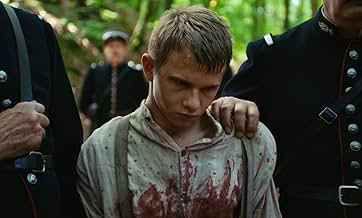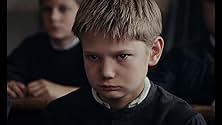In 1905, French seminarian Bruno Reidel is found guilty of murdering a child. At the request of the doctors observing him, he writes his memoirs to explain his action.In 1905, French seminarian Bruno Reidel is found guilty of murdering a child. At the request of the doctors observing him, he writes his memoirs to explain his action.In 1905, French seminarian Bruno Reidel is found guilty of murdering a child. At the request of the doctors observing him, he writes his memoirs to explain his action.
- Awards
- 2 wins & 11 nominations total
- Director
- Writer
- All cast & crew
- Production, box office & more at IMDbPro
Featured reviews
The title of this review in my opinion sums up a lot, if not all of the film. The lead actor and the director are both new to me, and both I sense intuitively should work together again. From the opening and shocking sequence; explicit without being totally explicit I was caught up in the drama of this 17 year old and his need to murder. The ending in my opinion should have been as less explicit as the opening, as so called evil actions are better shown obliquely than head on in serious films. Less for me equals more and this is why I have given it a 9 instead of a full 10. To give some idea without spoilers it became Pasolini's ' Salo ' instead of the near Bresson film that I had watched so far. The question asked throughout is why this teenager in 1905 should have wanted to kill a child of 12, and frankly despite all efforts to make Bruno Reidal, the killer, give an answer to this the more the reason becomes elusive. For instance why should Bruno have homicidal fantasies instead of sexual ones during his compulsive acts of masturbation ? Was it due to his religious aspirations and the heavy weight of the Church ? Was it his ( to me ) unfounded belief that he was not good looking ? Could he only satisfy his guilt ridden desires for handsome men by imagining their torture and death instead of their sexual pleasure ? As I watched this beautifully filmed story I was not as appalled by Bruno as perhaps I should have been and that was due to his very real love for a youth called Blondel. Sadly that love was tainted by sadistic fantasies as well. I am not keen on the ' bad ' seed theory of evil in people, but the sheer, and to me overdone horror of the ending could easily reinforce that theory in viewers. A brilliantly made film accentuated by Olivier Messiaen's music and with images sometimes worthy of Caspar David Friedrich had me for the most part spellbound. One final point; this should not be put into any simplistic Gay interest category. If anything it is a deeply questioning religious film, and the repressions are as heterosexual as well as being homosexual.
In 1976,René Allio released "Moi Pierre Rivière ,ayant égorgé ma mère ,mon frère et ma soeur "( = having slit mother ,brother and sister) which could have been subtitled "anatomy of a murder". It' was a true story which happened in the rural Normandie in the nineteenth century .
Waiting for his trial,he wrote a manuscript where he told the whole story.
Pierre was a complex character,whose behavior thoroughly eluded the viewer. He considered his family crude uneducated peasants.
Pierre's report was stunning: the style is perfect,using a very refined French,most of the verbs in the past historic(Passé Simple) a tense which increased the distance between Pierre and the events he depicted.
What am I driving at? Simply that there are strong analogies between Pierre and Bruno ;all that I wrote about the former can apply to the latter with a notable difference : Pierre was not taught in an elite school like Bruno : the petit séminaire :the minor seminary was a secondary school (junior and high school) that would train both future seminarians for the major seminary and students who would remain lay(now obsolete,it was important through 1930 ). As Bruno 's family could not afford the price of the studies , this religious school was the only way for him to carry on with his studies .
But it was then and it is now;today , words like "masturbation" can be used without offending anyone ;at the time ,it was considered a deadly sin ,guaranteed to send you to Hell;abused when he was hardly a teenager , Bruno is a clever proud young man ,with a philosophy close to Friedrich Wilhelm Nietzsche's he never read ;he feels his superiority and a love/hate relationship develops between him ,a poor peasant and the proud clever handsome young bourgeois he meets ; he feels the space between them and he wants to become their equal and more ; like both gay students in Hitchcock's "rope" , Fleischer's "compulsion" ,and more precisely Tom Kalin's "swoon"(Loeb and Leopold) sex leads him to crime ;he wants to own them ,like a man possesses a woman (or another man);to act is to kill ,for he realizes that a sexual intercourse won't satisfy him more than onanism (he self-abuses eight times a day)he's ashamed of
To write that "Bruno Reidal " came aside as a shock in a French cinema lost in trite love stories, feel good, indifferent thrillers and coarse comedies ,is to state the obvious; almost entirely told in a neuter voice over ,in a style close to Bresson (there are few really horrible scenes , the economy of means is remarkable) ,it's the kind of film you won't forget .
Waiting for his trial,he wrote a manuscript where he told the whole story.
Pierre was a complex character,whose behavior thoroughly eluded the viewer. He considered his family crude uneducated peasants.
Pierre's report was stunning: the style is perfect,using a very refined French,most of the verbs in the past historic(Passé Simple) a tense which increased the distance between Pierre and the events he depicted.
What am I driving at? Simply that there are strong analogies between Pierre and Bruno ;all that I wrote about the former can apply to the latter with a notable difference : Pierre was not taught in an elite school like Bruno : the petit séminaire :the minor seminary was a secondary school (junior and high school) that would train both future seminarians for the major seminary and students who would remain lay(now obsolete,it was important through 1930 ). As Bruno 's family could not afford the price of the studies , this religious school was the only way for him to carry on with his studies .
But it was then and it is now;today , words like "masturbation" can be used without offending anyone ;at the time ,it was considered a deadly sin ,guaranteed to send you to Hell;abused when he was hardly a teenager , Bruno is a clever proud young man ,with a philosophy close to Friedrich Wilhelm Nietzsche's he never read ;he feels his superiority and a love/hate relationship develops between him ,a poor peasant and the proud clever handsome young bourgeois he meets ; he feels the space between them and he wants to become their equal and more ; like both gay students in Hitchcock's "rope" , Fleischer's "compulsion" ,and more precisely Tom Kalin's "swoon"(Loeb and Leopold) sex leads him to crime ;he wants to own them ,like a man possesses a woman (or another man);to act is to kill ,for he realizes that a sexual intercourse won't satisfy him more than onanism (he self-abuses eight times a day)he's ashamed of
To write that "Bruno Reidal " came aside as a shock in a French cinema lost in trite love stories, feel good, indifferent thrillers and coarse comedies ,is to state the obvious; almost entirely told in a neuter voice over ,in a style close to Bresson (there are few really horrible scenes , the economy of means is remarkable) ,it's the kind of film you won't forget .
Amazing movie, with so many conflicting feelings that it can give you. The story does not reveal why but how and what was inside the kid's mind. Religion plays a great role here and it makes you think why some sins are greater than others, what is acceptable and what is not. Throughout the years, humanity accepted some of the sins as being normal, human while some remained at the same level. For those who grew up in the country side in a poor country, the scenery is all too familiar: the killing of a pig once a year and the work that is being done at a farm. Great lead actor, the future for this young guy is paved with success.
Chilling, disturbing, the true face of horror. Not for all audiences, not destined to be a blockbuster, you think of Robert Bresson cinema, very raw, austere, shorn, the true story of a young boy who became a killer. It may be seen as a documentary, about how people lived in those days, early 1900's in the deep French countryside, and above all a deep analysis of the human nature, thru the picture of this young boy. The off voice is more than useful, disturbing, shocking, incredible to hear and believe but true. This young boy, in a class room, among his fellow eight or ten years old students, who deeply thinks about killing them, slowly and with the feeling of excitment. From a true story. I have never felt so unconfortable in my movie goer 59 years life. Never. The contrast between the quietness of the countryside charm and the nasty, unbearable, unforgettable atmosphere is purely indescribable.
This is a rough movie to watch. Violence in it isn't just graphic, but psychological also. We are in the mind of a teen killer with any emotion or empathy towards the people around him; The worst of all is that, at one point, you can feel some empathy for Bruno. Based on a true story, this film is a detail journal of how a little boy became a killer. With a slow pace, the film involves you and in the shocking parts, it doesn't have any mercy: you will see in detail how evil can show its face in the most violent way possible.
- How long is Bruno Reidal, Confessions of a Murderer?Powered by Alexa
Details
- Release date
- Country of origin
- Languages
- Also known as
- Bruno Reidal, confession d'un meurtrier
- Filming locations
- Thérondels, Aveyron, France(village church)
- Production companies
- See more company credits at IMDbPro
Box office
- Gross worldwide
- $52,584
- Runtime1 hour 41 minutes
- Color
- Aspect ratio
- 1.66 : 1
Contribute to this page
Suggest an edit or add missing content


![Watch Trailer [OV]](https://m.media-amazon.com/images/M/MV5BMDFmNDNlYmUtYjFiZC00OGQwLWJlNzMtYjU1NGJkY2M5NWI2XkEyXkFqcGdeQXRyYW5zY29kZS13b3JrZmxvdw@@._V1_QL75_UX500_CR0)

















